Episodes
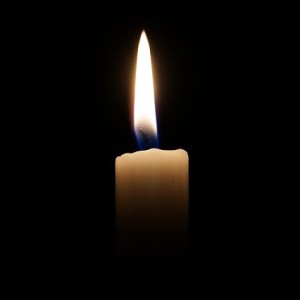
Friday Nov 01, 2019
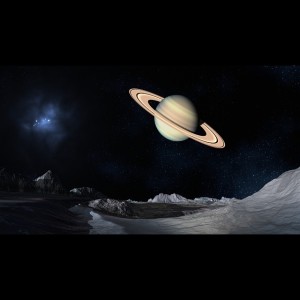
Monday Oct 28, 2019
Episode 083 - Astrobiology and the Search for Life with Jonathan Lunine
Monday Oct 28, 2019
Monday Oct 28, 2019
- Dr. Jonathan Lunine is the David C. Duncan Professor in the Physical Science and chair of the Department of Astronomy at Cornell University. He is also the vice president and a co-founder of the Society of Catholic Scientists.
- In this “part 5” of our interview, Dr. Lunine notes that planetary science was not always a distinct field. It drew upon components of astronomy or the geological study of the moon, for example. Astrobiology, with a goal of studying microbial life forms that may be found on exoplanets, is now at the point of relative infancy where planetary science stood about 50 years ago.
- Enceladus, one of the dozens of moons orbiting Saturn, is one site worth inspecting in the search for life. It could be based on carbon-bearing molecules different from those found in Earth life. The Cassini mission reported on plumes of water vapor and ice emanating from that moon. Dr. Lunine was part of a group proposing a mission called Enceladus Life Finder.
- Saturn’s moon Titan has seas filled with liquid methane. Could there be a form of biochemistry that works in liquid methane? It’s worth looking for, Dr. Lunine said.
- The Society of Catholic Scientists, with more than 1,000 members, is expanding its activities. The international group’s next annual meeting will consider the possibility of extraterrestrial life and the implications of such discoveries relevant to faith. The conference will be held in June 2020 at Providence College.
- Image by Reimund Bertrams from Pixabay

Monday Oct 21, 2019
Episode 082 - Extraterrestrial Life and Biosecurity with Jonathan Lunine
Monday Oct 21, 2019
Monday Oct 21, 2019
In this week's episode, we discuss the possibility of extraterrestrial life in our own solar system. Dr. Lunine talked about extraterrestrial life. It’s very possible that at least microbial life exists on other planets, he said, but the chances of complex, multicellular life are much more difficult to estimate.
We simply don't know what the possibilities are for life beyond the chemistry that it uses here on Earth. A potential tragedy that we would want to avoid at almost any cost would be the introduction of terrestrial microbes into a viable environment elsewhere, where they could become invasive species, grow and potentially outcompete the native life, which we would never get the chance to study and understand. NASA and other space agencies have policies in place to address this risk... hopefully, they will work.
Dr. Jonathan Lunine is the David C. Duncan Professor in the Physical Science and chair of the Department of Astronomy at Cornell University. He is also the vice president and a co-founder of the Society of Catholic Scientists.
Christianity and Extraterrestrials?: A Catholic Perspective , by Marie George, is a book worth reading, Dr. Lunine said.
He thanked all those who spoke at the 2019 conference of the Society of Catholic Scientists, and he commented on the high quality of the event. The website provides links to several TSSM episodes interviewing conference speakers.
Watch videos of speakers here.
Image by Reimund Bertrams from Pixabay
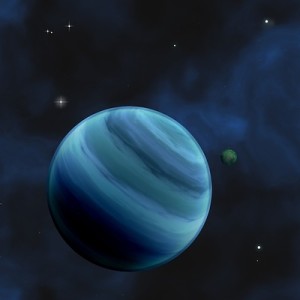
Monday Oct 14, 2019
Episode 081 - The Exoplanet Revolution with Jonathan Lunine
Monday Oct 14, 2019
Monday Oct 14, 2019
- Dr. Jonathan Lunine is the David C. Duncan Professor in the Physical Science and chair of the Department of Astronomy at Cornell University. He is also the vice president and a co-founder of the Society of Catholic Scientists.
- In this “part 3” of our interview, Dr. Lunine talked about exoplanets. The discovery of planets outside our Solar System has revolutionized planetary science.
- The Kepler space telescope mission, with its nine-year voyage which ended last year, made possible the detection of thousands of planets. It’s now understood, Lunine said, that planet formation is a common part of star formation.
- Lunine noted that Cornell University, where he is on the faculty, has many new avenues of astrophysics and planetary science research. The Carl Sagan Institute hosts a multidisciplinary team studying exoplanets.
- Half of this year's Nobel Prize in Physics went to Michel Mayor and Didier Queloz for their discovery of the first exoplanet around an ordinary star.
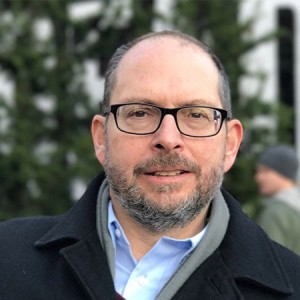
Monday Oct 07, 2019
Episode 080 - The Culture of "Science vs. Religion" with Jonathan Lunine
Monday Oct 07, 2019
Monday Oct 07, 2019
- Dr. Jonathan Lunine is the David C. Duncan Professor in the Physical Science and chair of the Department of Astronomy at Cornell University. He is also the vice president and a co-founder of the Society of Catholic Scientists.
- In this “part 2” of our interview, Dr. Lunine cited the book Secularity and Science by Elaine Ecklund (mentioned and linked in episode 79) and co-authors. The perceived conflict between faith and science is largely a Western phenomenon, according to Ecklund’s research, and it’s especially visible in the United States. Elsewhere, cultural education more fully incorporates an education about religion, so these people are more comfortable with the integration of the two.
- He said Catholic news services and The Christian Science Monitor are among the organizations where journalists are more likely interested in the combination of topics in science and religion.

Monday Sep 30, 2019
Episode 079 - Conversion and Witness with Jonathan Lunine
Monday Sep 30, 2019
Monday Sep 30, 2019
- Dr. Jonathan Lunine is the David C. Duncan Professor in the Physical Science and chair of the Department of Astronomy at Cornell University. He is also the vice president and a co-founder of the Society of Catholic Scientists.
- Here is information about the Vatican Observatory. It was one of the starting points for Lunine’s exploration of the compatibility between science and the Catholic faith.
- He met Stephen Barr in 2014, and this led to their discussions about establishing the Society of Catholic Scientists. Here is a talk given by Barr at the University of Chicago.
- Here is a talk by Lunine about Georges Lemaitre, a Catholic priest recognized as an originator of the Big Bang theory. In our conversation, Lunine described a presentation on Lemaitre that he gave at Cornell as a kind of “coming-out party” for him as a Catholic convert with his own story to tell. He has addressed Catholic students with the advice to share one’s faith story but to be judicious, following the practice of St. Paul, who adapted his messages to his audiences. A recommendation for discussions of faith: “There’s a time and a place for everything.”
- Lunine mentioned Elaine Ecklund, who has studied what scientists think about the American culture’s understanding that science and religion are incompatible. Harvard physicist Lisa Randall, who has said belief in God is incompatible with science, is an example of the resistance to faith that many scientists encounter in academia, Lunine said. Our culture gives much credibility to scientists, who owe it to their audiences to be clear about when they are speaking as individuals rather than scholarly experts. Lunine also mentioned the Thomistic Institute, which has a chapter on the Cornell campus founded by a graduate student.
- Part of the difficulty in the dialogue between science and religion is a popular but erroneous view that the Bible was intended to be a book of science. Here is a discussion of St. Augustine’s examination of this claim. Another challenge, Lunine said, is that our children generally grow up without a substantive education in religion.
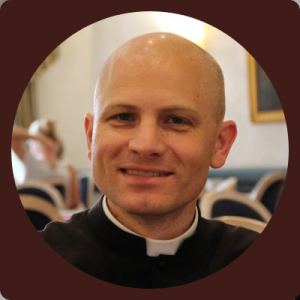
Monday Sep 23, 2019
Episode 078 - Fr. John Hollowell
Monday Sep 23, 2019
Monday Sep 23, 2019
- Father John Hollowell is a priest of the Archdiocese of Indianapolis. He is well-known for his blog, “On This Rock.” His pastoral duties include parish leadership and chaplain roles at DePauw University and the Putnamville Correctional Faciltiy.
- Fr. Hollowell spoke with Paul Giesting about the number of priests throughout history who have also been active as scientists. Here is one list of priest-scientists provided by National Catholic Register.
- Pope John Paul II created a commission to review the Galileo Affair, and this resulted in documents officially apologizing for the Catholic Church’s historic, and hyperbolized dispute against Galileo’s statements.
- Here is a link to the book that was discussed: Steven Pinker’s The Blank Slate: The Modern Denial of Human Nature.
- Fr. Hollowell and Paul discussed the long-running football rivalry between DePauw University and Wabash College.
- See Fr. Hollowell online at Facebook and YouTube. And also see his interview with well-known digital Catholic voice Brandon Vogt.
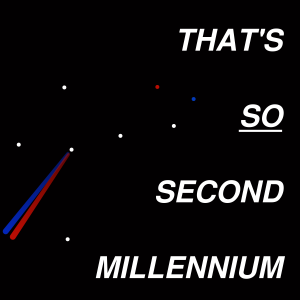
Monday Sep 16, 2019
Episode 077
Monday Sep 16, 2019
Monday Sep 16, 2019
Paul here. A short episode this week. We're taking a little time off to celebrate the milestone of releasing our last SCS 2019 conference speaker interview with Megan Levis last week.
The pace of interviews is likely to slow a bit, but we have several that we're looking forward to. Next week we have Fr John Hollowell, an engaging priest, campus minister, prison chaplain, blogger and social media personality here in the Archdiocese of Indianapolis. We will be talking to Jonathan Lunine again soon to further explore his fascinating perspective. Bill is in discussions with John Cavadini, theologian at Notre Dame, and hopefully we will get the chance to explore some issues related to education and culture from a Catholic perspective. Paul is also getting ready to record the first version of a talk on faith and science in his own life that he hopes to begin giving at colleges and perhaps parishes, which we will release here as well.
Discussions are still underway for Gold Masses here in central Indiana. It's possible that Indiana University, IUPUI in Indianapolis, Rose-Hulman Institute of Technology, and Purdue University might have Gold Masses, depending on whether more people get involved and help make the events happen.
Now some thoughts from Bill:
- Friends, this episode is a short, simple, heartfelt note befitting an approach that has been at the heart of “That’s So Second Millennium” right from its start nearly a year and half ago. The approach springs from the vision that prompted Dr. Paul Giesting to start this podcast and which resonated strongly with Bill Schmitt—yours truly, Paul’s co-host and the “show notes” writer.
- What is the vision? As Paul says at the beginning of each episode, “we look forward to the new synthesis in the new millennium between faith, philosophy and science.” We seek to celebrate continuous inquiry in all three fields by talking with great guests about how their own pursuits of knowledge and wisdom have brought deeper, broader insights from which we all can benefit. There’s good reason to pursue the benefit because this third millennium has brought us more challenging questions which must be addressed with a full toolkit for understanding.
- Inspired by our passion to spread updated, holistic, well-grounded understanding of many aspects of human life, visible and invisible, this podcast aims to generate authentic conversations with you, our listeners. The authenticity includes candor about another aspect of life in this millennium (or any millennium): It’s tough out there on Planet Earth. One must give voice to the frustrations marking our past, present and future as earthen vessels who are called to carry forward graces inextricably submerged in mystery. Paul’s inviting us to share the frustration and mystery with him in order to deepen our conversations.
- It’s our intention to continue expanding the conversations on our side of the podcast. If we don’t do that, there’s no chance to help achieve the synthesis that can bring greater happiness and healing in our very exciting world of cracked pots. Paul outlines some of our planned interviews and collaborations as an invitation for greater outreach on your side of the podcast. Let’s keep the amazing momentum of 77 episodes going and growing!
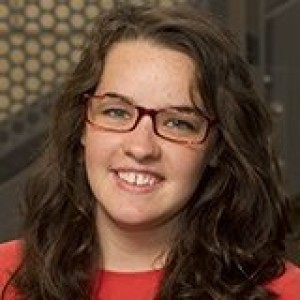
Monday Sep 09, 2019
Episode 076 - Megan Levis, part 2
Monday Sep 09, 2019
Monday Sep 09, 2019
- This is the second half of TSSM’s interview with Megan Levis. We talked at greater length about this graduate student’s research and its good fit with values-informed thought, with the Society of Catholic Scientists, and even literature. The Society held its third annual conference at the University of Notre Dame a few months ago.
- In Megan’s presentation to the scientists at the SCS annual conference, she posed the question: How do you distinguish and exercise ethical responsibilities when something like brain organoids are “made in the image and likeness of man rather than the image and likeness of God.” Organoids are multicellular systems built from brain tissue. Are they just cell cultures or something so akin to the human being—particularly when they are brain organoids—that ethical duties arise out of respect for human dignity? This is a relatively new field where the scientific understanding and moral consideration still must develop in tandem, she explained. A New York Times article touched on some of the questions being raised.
- Megan’s own main research project as part of her graduate studies at Notre Dame deals with microfluidics. They are devices, a kind of miniature bio-reactor, in which researchers can grow cells and small organs. Her goal is to make it easier and less expensive to make microfluidics that can be used in future research. Here are resources on microfluidics from the journal Nature.
- Her collaborations in this area came about from her meeting with a leader in microfluidics technology, Dr. Fernando Ontiveros, while they were both attending a previous SCS conference. His team is exploring new applications for microfluidics, such as the growing of organoids.
- At what point should moral concerns tied to the dignity of the human person “kick in” when dealing with the brain and brain organoids? Where do you as a person reside in the body? The existence of a capacity for rational thought is a conventional scientific benchmark for the existence of personhood, Megan said. There are many theories of the complex brain-mind-body connection with personhood. The human person is a complex creature, not reducible to the brain or body alone. Here’s an exploration of some insights from National Geographic.
- There is a real role for literature in helping us to explore the many questions that combine operational questions of engineering and more abstract, integrated thinking about persons, Megan says. She recommends renowned author Walker Percy, who explored such subjects in Lost in the Cosmos: The Last Self-Help Book. He comments that being a human is inevitably an uncomfortable process involving tensions within our nature. Our culture tends to look to science for answers to the big questions of human nature, but literature and art are pathways to answers too; literature allows us to think without predispositions and suppositions, to discover truths about ourselves and the world that transcend scientifically measurable parts. As Megan put it, the ability to wonder about the world is a gift that is transmitted sometimes through engineering and sometimes through literature and art.
- Megan has been able to work with Ontiveros while he has done research and prepared journal articles at Notre Dame. With the support of mentors and advisors, she has embraced opportunities at Notre Dame and elsewhere to spend time thinking about faith and science in relationship. She attended a conference with like-minded graduate students interested in these connections. She has appreciated the insights of SCS president Stephen Barr and microbiologist Fr. Nicanor Austriaco, OP, a speaker at this year’s SCS conference. Barr is the author of Modern Physics and Ancient Faith. Austriaco has recorded a podcast available through the Thomistic Institute titled The Science and Practice of Christian Prayer.
- What does Megan recommend for graduate students and others who want to advance in their bioengineering studies while staying informed and mindful about the faith-related aspects? She highlights the power of community, building friendships and conversations over time with a diverse range of people on similar journeys, including philosophy and science. One can attend relevant lectures and conferences, such as those sponsored by Notre Dame’s De Nicola Center for Ethics and Culture. She recommends the resources of the Collegium Institute. Building and updating such mindfulness is a long-term process requiring persistence, she adds.

Monday Sep 02, 2019
Episode 075 - Megan Levis, part 1
Monday Sep 02, 2019
Monday Sep 02, 2019
- Megan Levis is a fifth-year graduate student in bioengineering at the University of Notre Dame. The topic of her talk at the annual conference of the Society of Catholic Scientists was “Created in the Image and Likeness of Man.” She described the University’s bioengineering program.
- Growing what can be deemed the beginnings of a human brain, for purposes of research, invites important ethical considerations. Levis has found resources at and through Notre Dame for deeper study of the responsibilities entailed in such research. She has worked with the John J. Reilly Center on science, technology and values. She has also been part of the Leadership Advancing Socially Engaged Research (LASER) program within the Graduate School.
- Levis participated in an NSFsupported workshop on engineering design principles of multicellular living systems. Such workshops reflect a growing nationwide interest in the ethical and societal ramifications of rapidly developing technology related to systems of living things. The interest is prompting collaboration among philosophers, scientists, ethicists and engineers.
- It’s a false dichotomy to separate faith and engineering. Levis said her advisor [Jeremiah Zartman] has been supportive of integrating values-related concerns, and that integration has made her research better. Now that there is an increased focus in bioengineering on the transfer, or translation, of knowledge from the lab bench to hospitals and clinical practice, the assessment of ethical implications is even more important.
- Organoids are systems built from human cells that begin to look like an organ. In this new field, it’s important to create room for philosophical understanding, but right now the field is dominated by engineers and scientists largely using terms that sound like clunky jargon. Philosophy tells us we need to define our terms better, Levis said. We need better ways to describe what’s going on in accessible ways that allow for ethical thinking. Engineers tend to look at every component in its specifics, but there is value in seeing how one thing is similar to something else so both may come under similar ethical principles.

